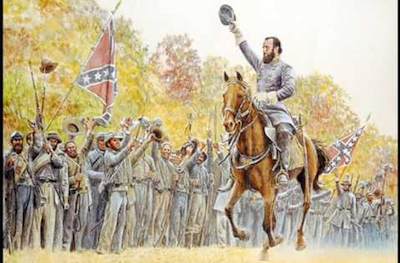By J.D. Longstreet ——Bio and Archives--January 21, 2014
American Politics, News | CFP Comments | Reader Friendly | Subscribe | Email Us

" ... Jackson’s operations became strategically critical to the entire eastern theater of the war. Stonewall would march south, to McDowell, and defeat troops under US Brigadier General Robert Schenck. From there, he would move north and defeat Banks’s army at Front Royal, and Winchester. He would push Banks clear out of the Shenandoah Valley. Jackson would turn south, and defeat US Major General John C. Fremont, at Cross Keys, and then turn on US Brigadier General James Shields at Port Republic. Accolades would abound for Jackson after his brilliant Shenandoah Campaign. With the valley secure, Jackson was ordered east, by R.E. Lee to reinforce the Army of Northern Virginia, now under his command. He would arrive in time to participate in the Seven Days battles, pushing McClellan from the peninsula. Jackson would continue to command brilliantly, with an overwhelming victory at Second Manassas, a tactical, well fought draw at Antietam and another sound victory in December 1862, at Fredericksburg. For his efforts, Jackson would be promoted lieutenant general, along with James Longstreet, in October 1862. May 2nd, 1863 was to be a fateful day for "Stonewall" Jackson and for the South. After successfully routing federal troops under Gen. Joe Hooker near Chancellorsville,
" ... after dark on May 2, Stonewall, along with A.P. Hill and staff, were reconnoitering the enemy lines – making plans to finish Hooker off, on May 3. When returning, his contingent would be fired on by his own troops. Jackson was seriously injured in the shoulder. He passed command to A.P. Hill, who due to his injury was unable to command, passed it to J.E.B. Stuart. That night, Jackson’s personal physician, Dr. Hunter McGuire would amputate Jackson’s left arm. Upon hearing of Jackson’s wounding, Lee was heard to say, “he has lost his left arm; but I lost my right arm.”Jackson was taken to Fairfield Plantation near Guinea Station, Jackson appeared to rally, but then contracted pneumonia. When Jackson's wife told him that Sunday that he was dying, Jackson said: “It is the Lord’s Day; my wish is fulfilled. I have always desired to die on Sunday.” Dr. Hunter McGuire, the attending physician, recorded Jackson;s last words: “Order A.P. Hill to prepare for action! Pass the infantry to the front rapidly! Tell major Hawks….” Then Jackson stopped. Finally, with a faint smile on his face he said, “Let us cross over the river, and rest under the shade of the trees.” At that point, Jackson stopped breathing. -- SOURCE: [url=http://thismightyscourge.com/2009/01/21/thomas-j-stonewall-jackson/]http://thismightyscourge.com/2009/01/21/thomas-j-stonewall-jackson/[/url] It was a devastating blow to the south. Many believe the WBTS would have had a different ending had "Stonewall" Jackson lived. There has been much speculation that Had Jackson been there to advise General Lee at Gettysburg, that awful battle would likely never have happened. Had it happened, it is fairly certain that Pickett's Charge would not have occurred. Jackson was a devout Christian who believed in predestination. Some say he saw himself as an instrument of God’s will, an Old Testament–style commander of armies in the service of his Lord.
"Like many Southerners, Jackson struggled with his feelings about the institution of slavery, but it obviously was God’s will that it exist—a belief widely held in the South. In 1855, he began teaching Sunday school classes to slaves in Lexington, a violation of Virginia’s segregation laws. Slaves came to know him through these classes and sometimes begged him to buy them so they wouldn’t be sold into the Deep South where they might be worked literally to death. In 1906, long after Jackson’s death, Reverend L. L. Downing, whose parents had been among the slaves in Jackson’s Sunday school, raised money to have a memorial window dedicated to him in the Fifth Avenue Presbyterian Church of Roanoke, Virginia—likely making "Stonewall" the only Confederate general to have a memorial in an African American church."The only man held in higher esteem than Thomas Jonathan "Stonewall" Jackson in the South is General Robert E. Lee. He was tough. He demanded nothing less than 100% effort by his men and he got it -- every time. Stonewall is a hero worthy of our praise. We proudly remember him today, on the anniversary of his birth. Sources: Thomas J. “Stonewall” Jackson – CSA Lieutenant General Stonewall Jackson
View Comments
(Editor’s note: J.D. Longstreet passed away in 2014. He will be greatly missed.)
Longstreet is a conservative Southern American (A native sandlapper and an adopted Tar Heel) with a deep passion for the history, heritage, and culture of the southern states of America. At the same time he is a deeply loyal American believing strongly in “America First”.
He is a thirty-year veteran of the broadcasting business, as an “in the field” and “on-air” news reporter (contributing to radio, TV, and newspapers) and a conservative broadcast commentator.
Longstreet is a veteran of the US Army and US Army Reserve. He is a member of the American Legion and the Sons of Confederate Veterans. A lifelong Christian, Longstreet subscribes to “old Lutheranism” to express and exercise his faith.